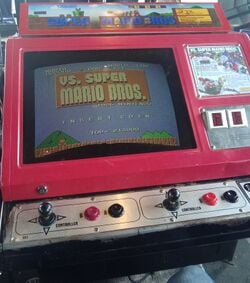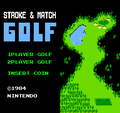VS. System: Difference between revisions
mNo edit summary Tag: Mobile edit |
m (Text replacement - "{{([Ss]erials|[Rr]elease)\|" to "{{flag list|") |
||
| (22 intermediate revisions by 9 users not shown) | |||
| Line 1: | Line 1: | ||
{{image|more=yes|VS. System logo}} | |||
{{system infobox | {{system infobox | ||
|image=[[File:VS Super Mario Bros Arcade Machine.jpg|250px]]<br>''[[VS. Super Mario Bros.]]'' in a VS. Table cabinet | |image=[[File:VS Super Mario Bros Arcade Machine.jpg|250px]]<br>''[[VS. Super Mario Bros.]]'' in a VS. Table cabinet | ||
|release=February 1984<ref name=February84GM> | |release=February 1984<ref name=February84GM>{{cite|url=archive.org/details/game-machine-magazine-19840215p/page/n1/mode/1up|title=''Game Machine''. February 15, 1984 issue|page=3}}</ref> | ||
|discontinued= | |discontinued={{flag list|Japan|Late 1985<ref name="gm"/><ref name="pm"/>|USA|July 31, 1992<ref name="cb1"/><ref name="cb2"/>}} | ||
|successor=[[Nintendo PlayChoice-10]] | |successor=[[Nintendo PlayChoice-10]] | ||
}} | }} | ||
The '''{{wp|Nintendo VS. System|VS. System}}''' is a collection of coin-operated VS. | The '''{{wp|Nintendo VS. System|VS. System}}''' is a collection of coin-operated VS. DualSystem or VS. UniSystem arcade systems, and the games were designed for competitive play. The VS. DualSystem comes with two screens and four sets of controls, meaning it had support for four simultaneous players, which only the launch title, ''[[nwiki:Tennis (NES)|VS. Tennis]]'', takes advantage of, not any games of the [[Super Mario (franchise)|''Super Mario'' franchise]]. The first model is the red sit-down type that lets players face each other and was later renamed VS. Table.<ref>{{cite|url=archive.org/details/vsdr.mario/mode/1up|title=''VS. Dr. Mario'' installation manual}}</ref> The upright type looks like two machines conjoined at an angle. The VS. UniSystem is like a conventional upright arcade cabinet with two sets of controls and a single screen, and it can either come as a dedicated gray cabinet or be a conversion from ''[[Donkey Kong (game)|Donkey Kong]]'', ''[[Donkey Kong Jr. (game)|Donkey Kong Jr.]]'', or ''{{wp|Popeye (game)|Popeye}}'' cabinets. It is not possible to convert the dedicated wide-body ''[[Mario Bros. (game)|Mario Bros.]]'' cabinets or the ''{{wp|Punch-Out!! (arcade game)|Punch-Out!!}}'' cabinets. In Japan, there are conversion kits for cocktail cabinets.<ref>{{file link|VS. Golf Pinball Japanese flyer back.jpg|Cocktail conversion kit flyer}}</ref> | ||
The VS. System was designed in response to the {{wp|video game crash of 1983}} | The VS. System was designed in response to the {{wp|video game crash of 1983}} and the collapse of a proposed deal with Atari to distribute the [[Family Computer]] in the United States. Knowing that arcade gaming was still commercially successful in North America, [[Nintendo]] president [[Hiroshi Yamauchi]] conceived the VS. System as a way to gauge consumer interest in Nintendo's home console games.<ref>{{cite|author=Stark, Chelsea|date=October 19, 2015|url=mashable.com/archive/nintendo-nes-launch-atari|title=How Nintendo brought the NES to America -- and avoided repeating Atari's mistakes|publisher=Mashable|accessdate=January 20, 2024}}</ref><ref>{{cite|author=Horowitz, Ken|date=July 30, 2020|url=books.google.com/books?id=Y3D0DwAAQBAJ&pg=PA119|title="The Vs. System (1984)" - Beyond Donkey Kong: A History of Nintendo Arcade Games''|publisher=McFarland & Company|page=119–128|isbn=978-1-4766-4176-8}}</ref> The precursor to the VS. System line is the Nintendo-Pak conversion kits. ''Mario Bros.'' was the first to be available as a Nintendo-Pak, in addition to selling the dedicated wide-body cabinets.<ref>{{cite|url=archive.org/details/mariobrospak/mode/1up|title=''Mario Bros.'' Nintendo-Pak'' manual}}</ref> ''[[Donkey Kong 3]]'' was available only as a Nintendo-Pak, which spared operators from having to buy the cabinet.<ref>{{cite|url=archive.org/details/donkeykong3/mode/1up|title=''Donkey Kong 3'' Nintendo-Pak manual}}</ref> | ||
The games are mostly ports of [[Nintendo Entertainment System]] | The VS. System games were the last arcade games Nintendo of Japan released before leaving the business in late 1985. This was despite the high demand of ''[[VS. Super Mario Bros.]]'', which never had a physical arcade release in the country.<ref name="gm">{{cite|url=onitama.tv/gamemachine/pdf/19860301p.pdf#page=13|title="Coin-Op "Super Mario" Will Shop To Overseas" - Game Machine|publisher=Amusement Press|date=March 1, 1986}}</ref><ref name="pm">{{cite|url=archive.org/details/play-meter-volume-12-number-5-april-1986-600DPI/Play%20Meter%20-%20Volume%2012%2C%20Number%205%20-%20April%201986%20%28Compressed%29/page/9/mode/1up|title=Play Meter - Volume 12, Number 5|date=April 1986}}{{page needed}}</ref> The system had a longer life in North America; new games were released for it as late as 1990, and it was successful enough to spur the development of the [[Nintendo PlayChoice-10]]. By the time Nintendo of America announced it would stop producing arcade equipment on July 31, 1992,<ref name="cb1">{{cite|url=archive.org/details/cashbox56unse_0/page/28/mode/1up|title="Nintendo Will No Longer Produce Coin-Op Equipment" - Cashbox}}{{page needed}}</ref><ref name="cb2">{{cite|url=archive.org/details/cashbox56unse_1/page/29/mode/1up|title="Nintendo Stops Games Manufacturing; But Will Continue Supplying Software" - Cashbox}}{{page needed}}</ref> however, no new VS. games were coming out. | ||
The VS. System games are mostly ports of Family Computer and [[Nintendo Entertainment System]] games, although many have notable changes in their graphics, gameplay, and difficulty. One exception is ''[[VS. Wrecking Crew]]'', released a year before its Family Computer counterpart ''[[Wrecking Crew]]'', from which it greatly differs. | |||
==List of ''Super Mario'' games== | ==List of ''Super Mario'' games== | ||
| Line 19: | Line 22: | ||
|''[[Wrecking Crew]]'' | |''[[Wrecking Crew]]'' | ||
|- | |- | ||
|''[[VS. Pinball]]'' | |''[[Pinball (game)|VS. Pinball]]'' | ||
|''[[Pinball (game)|Pinball]]'' | |''[[Pinball (game)|Pinball]]'' | ||
|- | |- | ||
|''[[VS. Golf]]'' | |''[[Stroke & Match Golf|VS. Golf]]'' | ||
|''[[Golf]]'' | |''[[Golf]]'' | ||
|- | |- | ||
| Line 28: | Line 31: | ||
|''[[Super Mario Bros.]]'' | |''[[Super Mario Bros.]]'' | ||
|- | |- | ||
|''[[VS. Dr. Mario]]'' | |''[[Dr. Mario (game)#VS. Dr. Mario|VS. Dr. Mario]]'' | ||
|''[[Dr. Mario (game)|Dr. Mario]]'' | |''[[Dr. Mario (game)|Dr. Mario]]'' | ||
|} | |} | ||
''VS. Dr. Mario'' is the only arcade version | ''VS. Dr. Mario'' is the only arcade version unavailable on the ''[[Arcade Archives]]''. | ||
==Gallery== | ==Gallery== | ||
| Line 56: | Line 59: | ||
<gallery> | <gallery> | ||
MarioVSSystem.jpg|Library of VS. titles flyer | MarioVSSystem.jpg|Library of VS. titles flyer | ||
VS System Flyer WC.jpg|Another library of VS. titles flyer | |||
VS. Golf Pinball Japanese flyer front.jpg|''VS. Golf'' / ''VS. Pinball'' flyer showing off the upright VS. DualSystem | VS. Golf Pinball Japanese flyer front.jpg|''VS. Golf'' / ''VS. Pinball'' flyer showing off the upright VS. DualSystem | ||
VSWreckingCrewCabinetFlyerJP.png|Earlier Japanese flyer of ''VS. Wrecking Crew'' | VSWreckingCrewCabinetFlyerJP.png|Earlier Japanese flyer of ''VS. Wrecking Crew'' | ||
| Line 69: | Line 73: | ||
<references/> | <references/> | ||
{{ | {{Systems}} | ||
[[Category:Systems]] | [[Category:Systems]] | ||
[[Category:Reissues]] | |||
Latest revision as of 19:12, September 27, 2024
It has been requested that more images be uploaded for this article. Remove this notice only after the additional images have been added. Specific(s): VS. System logo
| VS. System | |
|---|---|
 VS. Super Mario Bros. in a VS. Table cabinet | |
| Release date | February 1984[1] |
| Discontinued | |
| Successor | Nintendo PlayChoice-10 |
The VS. System is a collection of coin-operated VS. DualSystem or VS. UniSystem arcade systems, and the games were designed for competitive play. The VS. DualSystem comes with two screens and four sets of controls, meaning it had support for four simultaneous players, which only the launch title, VS. Tennis, takes advantage of, not any games of the Super Mario franchise. The first model is the red sit-down type that lets players face each other and was later renamed VS. Table.[6] The upright type looks like two machines conjoined at an angle. The VS. UniSystem is like a conventional upright arcade cabinet with two sets of controls and a single screen, and it can either come as a dedicated gray cabinet or be a conversion from Donkey Kong, Donkey Kong Jr., or Popeye cabinets. It is not possible to convert the dedicated wide-body Mario Bros. cabinets or the Punch-Out!! cabinets. In Japan, there are conversion kits for cocktail cabinets.[7]
The VS. System was designed in response to the video game crash of 1983 and the collapse of a proposed deal with Atari to distribute the Family Computer in the United States. Knowing that arcade gaming was still commercially successful in North America, Nintendo president Hiroshi Yamauchi conceived the VS. System as a way to gauge consumer interest in Nintendo's home console games.[8][9] The precursor to the VS. System line is the Nintendo-Pak conversion kits. Mario Bros. was the first to be available as a Nintendo-Pak, in addition to selling the dedicated wide-body cabinets.[10] Donkey Kong 3 was available only as a Nintendo-Pak, which spared operators from having to buy the cabinet.[11]
The VS. System games were the last arcade games Nintendo of Japan released before leaving the business in late 1985. This was despite the high demand of VS. Super Mario Bros., which never had a physical arcade release in the country.[2][3] The system had a longer life in North America; new games were released for it as late as 1990, and it was successful enough to spur the development of the Nintendo PlayChoice-10. By the time Nintendo of America announced it would stop producing arcade equipment on July 31, 1992,[4][5] however, no new VS. games were coming out.
The VS. System games are mostly ports of Family Computer and Nintendo Entertainment System games, although many have notable changes in their graphics, gameplay, and difficulty. One exception is VS. Wrecking Crew, released a year before its Family Computer counterpart Wrecking Crew, from which it greatly differs.
List of Super Mario games[edit]
| Arcade game | Nintendo Entertainment System game |
|---|---|
| VS. Wrecking Crew | Wrecking Crew |
| VS. Pinball | Pinball |
| VS. Golf | Golf |
| VS. Super Mario Bros. | Super Mario Bros. |
| VS. Dr. Mario | Dr. Mario |
VS. Dr. Mario is the only arcade version unavailable on the Arcade Archives.
Gallery[edit]
Cabinets[edit]
Screenshots[edit]
Flyers[edit]
References[edit]
- ^ Game Machine. February 15, 1984 issue. Page 3.
- ^ a b March 1, 1986. "Coin-Op "Super Mario" Will Shop To Overseas" - Game Machine. Amusement Press.
- ^ a b April 1986. Play Meter - Volume 12, Number 5.[page number needed]
- ^ a b "Nintendo Will No Longer Produce Coin-Op Equipment" - Cashbox.[page number needed]
- ^ a b "Nintendo Stops Games Manufacturing; But Will Continue Supplying Software" - Cashbox.[page number needed]
- ^ VS. Dr. Mario installation manual.
- ^ Cocktail conversion kit flyer
- ^ Stark, Chelsea (October 19, 2015). How Nintendo brought the NES to America -- and avoided repeating Atari's mistakes. Mashable. Retrieved January 20, 2024.
- ^ Horowitz, Ken (July 30, 2020). "The Vs. System (1984)" - Beyond Donkey Kong: A History of Nintendo Arcade Games. McFarland & Company. ISBN 978-1-4766-4176-8. Page 119–128.
- ^ Mario Bros. Nintendo-Pak manual.
- ^ Donkey Kong 3 Nintendo-Pak manual.
| Video game systems and add-ons | |
|---|---|
| Nintendo home consoles | Family Computer/Nintendo Entertainment System (Family BASIC, Family Computer Disk System) • Super Famicom/Super Nintendo Entertainment System (Satellaview, Super Game Boy) • Nintendo 64 (Nintendo 64DD) • Nintendo GameCube (Game Boy Player) • Wii (Virtual Console, WiiWare) • Wii U (Virtual Console) • Nintendo Switch |
| Nintendo handhelds | Game & Watch • Game Boy • Virtual Boy • Game Boy Color • Game Boy Advance • Nintendo DS (Nintendo DSi, DSiWare) • Nintendo 3DS (Virtual Console) • Nintendo Switch |
| Other | MS-DOS • VS. System • Nintendo PlayChoice-10 • Nintendo Super System • Nelsonic Game Watch • Super Mario Bros. Watch • Gamewatch Boy • Philips CD-i • Mini Classics • Triforce • Visteon Dockable Entertainment System • Classics • LodgeNet • Nintendo Sound Clock: Alarmo |


















